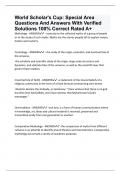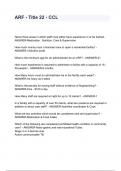World Scholar's Cup: Special Area
Questions And Answers With Verified
Solutions 100% Correct Rated A+
Mythology - ANSWER✔✔ - variously to the collected myths of a group of people
or to the study of such myths. Myths are the stories people tell to explain nature,
history and customs.
Cosmology - ANSWER✔✔ - the study of the origin, evolution, and eventual fate of
the universe.
-the scholarly and scientific study of the origin, large-scale structures and
dynamics, and ultimate fate of the universe, as well as the scientific laws that
govern these realities.
Creed (article of faith) - ANSWER✔✔ -a statement of the shared beliefs of a
religious community in the form of a fixed formula summarizing core tenets.
-Muslims declare the shahada, or testimony: "I bear witness that there is no god
but (the One) God (Allah), and I bear witness that Muhammad is God's
messenger."
Oral tradition - ANSWER✔✔ -oral lore, is a form of human communication where
in knowledge, art, ideas and cultural material is received, preserved and
transmitted orally from one generation to another.
Comparative Mythology - ANSWER✔✔ -the comparison of myths from different
cultures in an attempt to identify shared themes and characteristics. Comparative
mythology has served a variety of academic purposes.
,National myth - ANSWER✔✔ -an inspiring narrative or anecdote about a nation's
past. Such myths often serve as an important national symbol and affirm a set of
national values. A national myth may sometimes take the form of a national epic
or be incorporated into a civil religion.
-National myths often exist only for the purpose of state-sponsored propaganda.
- a dictator might tell stories of his ivinity or greatness to increase popularity
Pseudoscience - ANSWER✔✔ -consists of claims, beliefs, or practices presented as
being plausible scientifically, but which are not justifiable by the scientific
method.
-Examples of pseudoscience concepts, proposed as scientific though they are not,
include acupuncture, alchemy, ancient astronauts, applied kinesiology, astrology,
Ayurvedic medicine, biorhythms, brain types, cellular memory, homeopathy.
Monomyth - ANSWER✔✔ -In narratology and comparative mythology, the
monomyth, or the hero's journey, is the common template of a broad category of
tales that involve a hero who goes on an adventure, and in a decisive crisis wins a
victory, and then comes home changed or transformed.
Mythomoteur - ANSWER✔✔ - the constitutive myth that gives an ethnic group its
sense of purpose.
Miracle - ANSWER✔✔ -A miracle is an event not explicable by natural or scientific
laws
-"Miracle" in the Quran can be defined as a supernatural intervention in the life of
human beings - Islam
, Underdog - ANSWER✔✔ -A person or group in a competition, usually in sports
and creative works, who is popularly expected to lose. The party, team, or
individual expected to win is called the favorite or top dog. In the case where an
underdog wins, the outcome is an upset. An "underdog bet" is a bet on the
underdog or outsider for which the odds are generally higher.
Noble lie - ANSWER✔✔ In politics, a noble lie is a myth or untruth, often, but not
invariably, of a religious nature, knowingly propagated by an elite to maintain
social harmony or to advance an agenda. The noble lie is a concept originated by
Plato as described in the Republic.
Alternative fact - ANSWER✔✔ A phrase used by U.S. Counselor to the President
Kellyanne Conway during a Meet the Press interview on January 22, 2017, in
which she defended White House Press Secretary Sean Spicer's false statement
about the attendance at Donald Trump's inauguration as President of the United
States. When pressed during the interview with Chuck Todd to explain why Spicer
"utter[ed] a provable falsehood", Conway stated that Spicer was giving
"alternative facts." Todd responded, "Look, alternative facts are not facts. They're
falsehoods."
Skepticism - ANSWER✔✔ -Generally any questioning attitude or doubt towards
one or more items of putative knowledge or belief. It is often directed at domains,
such as morality (moral skepticism), religion (skepticism about the existence of
God), or the nature of knowledge (skepticism of knowledge).
Cosmic Egg - ANSWER✔✔ -the world egg is a beginning of some sort, and the
universe or some primordial being comes into existence by "hatching" from the
egg, sometimes lain on the primordial waters of the Earth.
The concept was resurrected by modern science in the 1930s and explored by
theoreticians during the following two decades. The idea comes from a perceived






